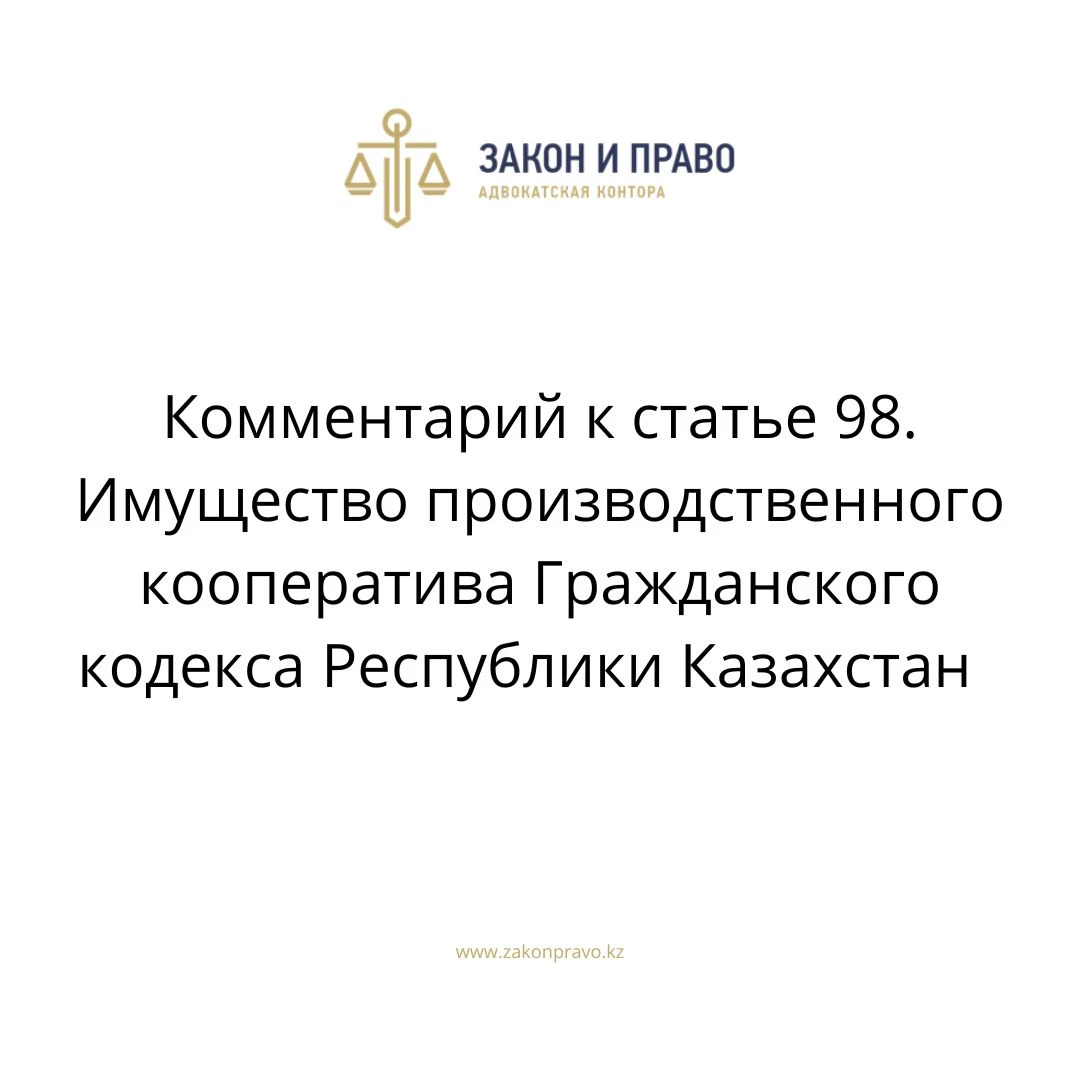Comment to Article 98. Property of a production cooperative of the Civil Code of the Republic of Kazakhstan
The sources of the formation of the property of the production cooperative are:
1) property contributions of cooperative members;
2) income received from its activities;
3) other sources not prohibited by legislative acts.
The shares of the cooperative's members in its property (shares) are calculated in percentage terms (Article 20 of the Decree on the Production Cooperative).
When a new member is admitted to the cooperative and makes a property contribution, the new size of the shares of the cooperative members in its property is determined. It should be borne in mind that the division of the cooperative's property into shares does not transform this property into the common shared ownership of the cooperative's members (although the Civil Code says that the share is the share of the cooperative's members in the cooperative's property). The property of the cooperative, although divided into shares, is the property of the cooperative itself. The legal significance of a share lies in the fact that, under certain conditions, the property mediated by it can be allocated to the ownership of a cooperative member (for example, upon his withdrawal from the cooperative, when foreclosing on the share of a cooperative member for his personal debts). Consequently, the share does not express the ownership right of a cooperative member to a share in the cooperative's property, but the right to claim this share, which can be realized under the circumstances provided for by the Civil Code.
The income of a production cooperative is determined based on the results for the year. The profits remaining after taxes and other mandatory payments remain at the full disposal of the cooperative and are distributed by the general meeting of its members for the purposes stipulated in the founding documents of the cooperative, including among the members of the cooperative.
Paragraph 2 of the commented article provides that the net income of a cooperative is distributed among its members in accordance with their labor participation, which also distinguishes a production cooperative from a business partnership, where net income is distributed among the participants in proportion to their share in the authorized capital. At the same time, it should be borne in mind that the cooperative's charter may contain a different procedure for distributing net income (for example, taking into account the amount of property contributions made by cooperative members, the size of their shares, a combination of different principles, etc.).
The agreement of the members of the cooperative or the provisions of its founding documents that preclude any of the cooperative's participants from participating in the distribution of net income and covering losses is invalid.
Upon leaving the cooperative, its member has the right to receive property or money corresponding to his share.
The grounds for withdrawal in this case do not matter - whether he leaves of his own free will or is excluded from the cooperative for failure to fulfill his duties (see paragraph 2 of art. 100 of the Civil Code).
When a cooperative is liquidated, its member has the right to allocate his share in the cooperative's property in proportion to his share.
The founding documents of a cooperative may provide for the formation of the authorized capital of the cooperative, which determines the minimum size of the cooperative's property, guaranteeing the interests of its creditors.
The size of the authorized capital and the procedure for its formation are established by the charter of the cooperative.
It should be borne in mind that today a production cooperative is the only type of commercial organization in respect of which legislative acts do not provide for the mandatory formation of the authorized capital. This simplifies the procedure for creating production cooperatives.
However, if a cooperative carries out activities in respect of which legislative acts provide for the organizations to have authorized capital in certain amounts, the cooperative is obliged to form it and use it in accordance with the procedure provided for by the said legislative acts. For example, insurance legislation stipulates that organizations engaged in insurance activities are required to have an authorized capital in the prescribed amounts. If a cooperative is engaged in insurance activities, it is obliged to form such an authorized capital.
A cooperative may create a reserve fund based on annual deductions from net income, designed to ensure the fulfillment of the cooperative's obligations to creditors and to cover retained earnings.
The size of the reserve fund and the procedure for its formation are established by the charter of the cooperative.
If a cooperative carries out activities in respect of which legislative acts provide for the availability of a reserve fund in certain amounts for organizations engaged in such activities, the cooperative is obliged to form it and use it in accordance with the procedure provided for by legislative acts.
The cooperative has the right to create other monetary and material funds necessary for its production and economic activities and social development.
The list of such funds, the procedure for their formation and expenditure are defined in the charter of the cooperative.
The Civil Code does not provide for the possibility of creating so-called "indivisible cooperative funds", i.e. funds that are not divided into shares of members and payments from which are not made upon leaving the cooperative.
Constitution Law Code Standard Decree Order Decision Resolution Lawyer Almaty Lawyer Legal service Legal advice Civil Criminal Administrative cases Disputes Defense Arbitration Law Company Kazakhstan Law Firm Court Cases
The commentary was prepared within the framework of the scientific and practical research program of the Scientific Research Center of Private Law of the Kazakh State Law University.
Head of the working group on the preparation of the draft Civil Code of the Republic of Kazakhstan, Corresponding Member of the Academy of Sciences of the Republic of Kazakhstan, Professor Suleimenov M.K.
Deputy head Professor Basin Yu.G.


